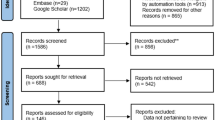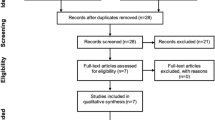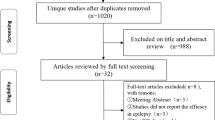Abstract
Purpose of Review
Drug-resistant epilepsy represents around one-quarter of epilepsies worldwide. Although ketogenic diets (KD) have been used for refractory epilepsy since 1921, the past 15 years have witnessed an explosion of KD use in the management of epilepsy. We aimed to review evidence from randomized controlled trials (RCTs) regarding the efficacy and safety of KD in drug-resistant epilepsy in children and adolescents.
Recent Findings
A literature search was performed in the Pubmed, Cohrane, Scopus, ClinicalTrials.gov, and Google Scholar databases. Predefined criteria were implemented regarding data extraction and study quality. Data were extracted from 14 RCTs in 1114 children and adolescents aged from 6 months to 18 years. Primary outcome was seizure reduction after the intervention. In 6 out of the 14 studies, there was a statistical significant seizure reduction by > 50% in the KD-treated group compared with the control group over a follow-up of 3–4 months. Secondary outcomes were adverse events, seizure severity, quality of life, and behavior. Gastrointestinal symptoms were the most frequent adverse events. Serious adverse events were rare.
Summary
We conclude that the KD is an effective treatment for drug-resistant epilepsy in children and adolescents. Accordingly, RCTs investigating long-term impact, cognitive and behavioral effects, and cost-effectiveness are much anticipated.





Similar content being viewed by others
Abbreviations
- AEDs:
-
Anti-Epileptic Drugs
- ASDs:
-
Anti-Seizure Drugs
- BDNF:
-
Βrain-Derived Neurotrophic Factor
- BHB:
-
Beta-Hydroxybutyric Acid
- BMI:
-
Body Mass Index
- CAU:
-
Care As Usual
- CKD:
-
Classic Ketogenic Diet
- GABA:
-
Gamma Aminobutyric Acid
- GI:
-
Gastrointestinal
- KD:
-
Ketogenic Diet
- LGIT:
-
Low Glycemic Index Treatment
- MAD:
-
Modified Atkins Diet
- MCT:
-
Medium Chain Triglycerides
- NADH:
-
Nicotinamide Adenine Dinucleotide Phosphate
- RCTs:
-
Randomized Controlled Trials
- ROS:
-
Reactive Oxygen Species
References
Papers of particular interest, published recently, have been highlighted as: • Of importance •• Of major importance
Camfield P, Camfield C. Incidence, prevalence and aetiology of seizures and epilepsy in children. Epileptic Disord. 2015. https://doi.org/10.1684/epd.2015.0736.
Fisher RS, et al. Definitions proposed by the International League Against Epilepsy (ILAE) and the International Bureau for Epilepsy (IBE). Epilepsia. 2005. https://doi.org/10.1111/j.1528-1167.2005.00273_4.x.
Sirven JI. Epilepsy: A Spectrum Disorder. Cold Spring Harb Perspect Med. 2015. https://doi.org/10.1101/cshperspect.a022848.
Kwan P, et al. Definition of drug resistant epilepsy: Consensus proposal by the ad hoc Task Force of the ILAE Commission on Therapeutic Strategies. Epilepsia. 2010. https://doi.org/10.1111/j.1528-1167.2009.02397.x.
Sheng J, Liu S, Qin H, Li B, Zhang X. Drug-Resistant Epilepsy and Surgery. Curr Neuropharmacol. 2017. https://doi.org/10.2174/1570159x15666170504123316.
Kwan P, Schachter SC, Brodie MJ. Drug-Resistant Epilepsy. N Engl J Med. 2011. https://doi.org/10.1056/NEJMra1004418.
Wheless JW. History of the ketogenic diet. Epilepsia. 2008. https://doi.org/10.1111/j.1528-1167.2008.01821.x.
Cervenka MC, Doerrer S, Henry BJ, Kossoff EH, Turner Z. The Ketogenic and modified Atkins diets : treatments for epilepsy and other disorders. 6th ed. New York: Demos Health; 2016.
Freeman JM, Kossf EH, Hartman AL. The ketogenic diet: One decade later. Pediatrics. 2007;119:535-43.
Williams E, Abrahams J, Maguire A, Harris G. A parent’s prerspective on dietary treatments for epilepsy. Epilepsy Res. 2012. https://doi.org/10.1016/j.eplepsyres.2011.09.024.
Auvin S. Non-pharmacological medical treatment in pediatric epilepsies. Rev Neurol. 2016. https://doi.org/10.1016/j.neurol.2015.12.009.
•• Lyons L, Schoeler NE, Langan D, Cross JH. Use of ketogenic diet therapy in infants with epilepsy: A systematic review and meta-analysis. Epilepsia. 2020. https://doi.org/10.1111/epi.16543. This systematic review indicates that KD is safe and tolerable and that it can be an effective treatment option for infants with drug-resistant epilepsy. However, there are few studies focusing on infants treated with KD, and high-quality evidence is lacking. High-quality randomized-controlled trials are needed to confirm the effectiveness, safety, and tolerability of dietary treatment in this vulnerable age group.
Cai QY, et al. Safety and tolerability of the ketogenic diet used for the treatment of refractory childhood epilepsy: a systematic review of published prospective studies. World J Pediatr. 2017. https://doi.org/10.1007/s12519-017-0053-2.
Wells J, Swaminathan A, Paseka J, Hanson C. Efficacy and safety of a ketogenic diet in children and adolescents with refractory epilepsy-a review. Nutrients. 2020. https://doi.org/10.3390/nu12061809.
•• Sourbron J, et al. Ketogenic diet for the treatment of pediatric epilepsy: review and meta-analysis. Child’s Nerv Syst. 2020. https://doi.org/10.1007/s00381-020-04578-7. This systematic review and meta-analysis investigated the efficacy of KD in drug-resistant epilepsy in children and adolescents. Given the beneficial clinical results, dietary interventions should be considered for children and adolescents with refractory epilepsy who are not eligible for epilepsy surgery. Future studies should be multi-center and long-term, and evaluate potential biomarkers and adverse effects.
Kj M, Cf J, Bresnahan R, Rg L, Pn C. Ketogenic diets for drug-resistant epilepsy. Cochrane Database Syst Rev. 2018. https://doi.org/10.1002/14651858.CD001903.pub4.www.cochranelibrary.com.
Prezioso G, Carlone G, Zaccara G, Verrotti A. Efficacy of ketogenic diet for infantile spasms: A systematic review. Acta Neurol Scand. 2018. https://doi.org/10.1111/ane.12830.
Keene DL. A Systematic Review of the Use of the Ketogenic Diet in Childhood Epilepsy. Pediatr Neurol. 2006. https://doi.org/10.1016/j.pediatrneurol.2006.01.005.
Jadad AR, et al. Assessing the quality of reports of randomized clinical trials: Is blinding necessary? Control Clin Trials. 1996. https://doi.org/10.1016/0197-2456(95)00134-4.
Karimzadeh P, Moosavian T, Moosavian HR. Effects of a formula-based ketogenic diet on refractory epilepsy in 1 to 3 year-old patients under classic ketogenic diet. Iran J Child Neurol. 2019. https://doi.org/10.22037/ijcn.v13i4.22876.
Hee Seo J, Mock Lee Y, Soo Lee J, Chul Kang H, Dong Kim H. Efficacy and tolerability of the ketogenic diet according to lipid:nonlipid ratios - Comparison of 3:1 with 4:1 diet. Epilepsia. 2007. https://doi.org/10.1111/j.1528-1167.2007.01025.x.
Neal EG, et al. The ketogenic diet for the treatment of childhood epilepsy: a randomised controlled trial. 2008. https://doi.org/10.1016/S1474.
Raju KNV, et al. Efficacy of 4:1 (classic) versus 2.5:1 ketogenic ratio diets in refractory epilepsy in young children: A randomized open labeled study. Epilepsy Res. 2011. https://doi.org/10.1016/j.eplepsyres.2011.05.005.
Lambrechts DAJE, de Kinderen RJA, Vles JSH, de Louw AJA, Aldenkamp AP, Majoie HJM. A randomized controlled trial of the ketogenic diet in refractory childhood epilepsy. Acta Neurol Scand. 2017. https://doi.org/10.1111/ane.12592.
Kang HC, et al. Comparison of short-versus long-term ketogenic diet for intractable infantile spasms. Epilepsia. 2011. https://doi.org/10.1111/j.1528-1167.2010.02940.x.
Wijnen BFM, et al. Long-term clinical outcomes and economic evaluation of the ketogenic diet versus care as usual in children and adolescents with intractable epilepsy. Epilepsy Res. 2017. https://doi.org/10.1016/j.eplepsyres.2017.03.002.
Sharma S, Goel S, Jain P, Agarwala A, Aneja S. Evaluation of a simplified modified Atkins diet for use by parents with low levels of literacy in children with refractory epilepsy: A randomized controlled trial. Epilepsy Res. 2016. https://doi.org/10.1016/j.eplepsyres.2016.09.002.
Sharma S, Sankhyan N, Gulati S, Agarwala A. Use of the modified Atkins diet for treatment of refractory childhood epilepsy: A randomized controlled trial. Epilepsia. 2013. https://doi.org/10.1111/epi.12069.
• Lakshminarayanan K, et al. Efficacy of low glycemic index diet therapy (LGIT) in children aged 2–8 years with drug-resistant epilepsy: A randomized controlled trial. Epilepsy Res. 2021. https://doi.org/10.1016/j.eplepsyres.2021.106574. This Randomized Controlled Trial examined the efficacy of LGIT in children aged 2-8 years with drug-resistant epilepsy. The administration of LGIT along with ongoing anti-seizure medications (ASM) is more efficacious in reducing seizure frequency as compared to ASM alone.
Gupta S, Dabla S, Kaushik JS. Modified Atkins Diet versus Low Glycemic Index Treatment for Drug-Resistant Epilepsy in Children: An Open Label, Randomized Controlled Trial. Indian Pediatr. 2021. http://www.ncbi.nlm.nih.gov/pubmed/33634794.
Sondhi V, et al. Efficacy of Ketogenic Diet, Modified Atkins Diet, and Low Glycemic Index Therapy Diet among Children with Drug-Resistant Epilepsy: A Randomized Clinical Trial. JAMA Pediatr. 2020. https://doi.org/10.1001/jamapediatrics.2020.2282.
Yoon J-R, Lee E, Dong Kim H, Soo Lee J, Chul KH. Comparison of ketogenic diet and modified atkins diet in children with epilepsy. Epilepsy Curr. 2014. https://doi.org/10.1002/central/CN-01010761.
Kim JA, et al. Efficacy of the classic ketogenic and the modified Atkins diets in refractory childhood epilepsy. Epilepsia. 2016. https://doi.org/10.1111/epi.13256.
Simeone TA, Simeone KA, Stafstrom CE, Rho JM. Do ketone bodies mediate the anti-seizure effects of the ketogenic diet? Neuropharmacology. 2018. https://doi.org/10.1016/j.neuropharm.2018.01.011.
Dahlin M, Prast-Nielsen S. The gut microbiome and epilepsy. EBioMedicine. 2019. https://doi.org/10.1016/j.ebiom.2019.05.024.
Nei M, Ngo L, Sirven JI, Sperling MR. Ketogenic diet in adolescents and adults with epilepsy. Seizure. 2014. https://doi.org/10.1016/j.seizure.2014.02.015.
IJff DM, et al. Cognitive and behavioral impact of the ketogenic diet in children and adolescents with refractory epilepsy: A randomized controlled trial. Epilepsy Behav. 2016. https://doi.org/10.1016/j.yebeh.2016.04.033.
Kayyali HR, Luniova A, Abdelmoity A. Ketogenic Diet Decreases Emergency Room Visits and Hospitalizations Related to Epilepsy. Epilepsy Res Treat. 2016. https://doi.org/10.1155/2016/5873208.
Author information
Authors and Affiliations
Corresponding author
Ethics declarations
Conflict of Interest
All authors declare that they have no conflict of interest.
Human and Animal Rights and Informed Consent
This article does not contain any studies with human or animal subjects performed by any of the authors.
Additional information
Publisher's Note
Springer Nature remains neutral with regard to jurisdictional claims in published maps and institutional affiliations.
This article is part of the Topical Collection on Diabetes and Obesity
Supplementary Information
Below is the link to the electronic supplementary material.
Rights and permissions
About this article
Cite this article
Desli, E., Spilioti, M., Evangeliou, A. et al. The Efficacy and Safety of Ketogenic Diets in Drug-Resistant Epilepsy in Children and Adolescents: a Systematic Review of Randomized Controlled Trials. Curr Nutr Rep 11, 102–116 (2022). https://doi.org/10.1007/s13668-022-00405-4
Accepted:
Published:
Issue Date:
DOI: https://doi.org/10.1007/s13668-022-00405-4




